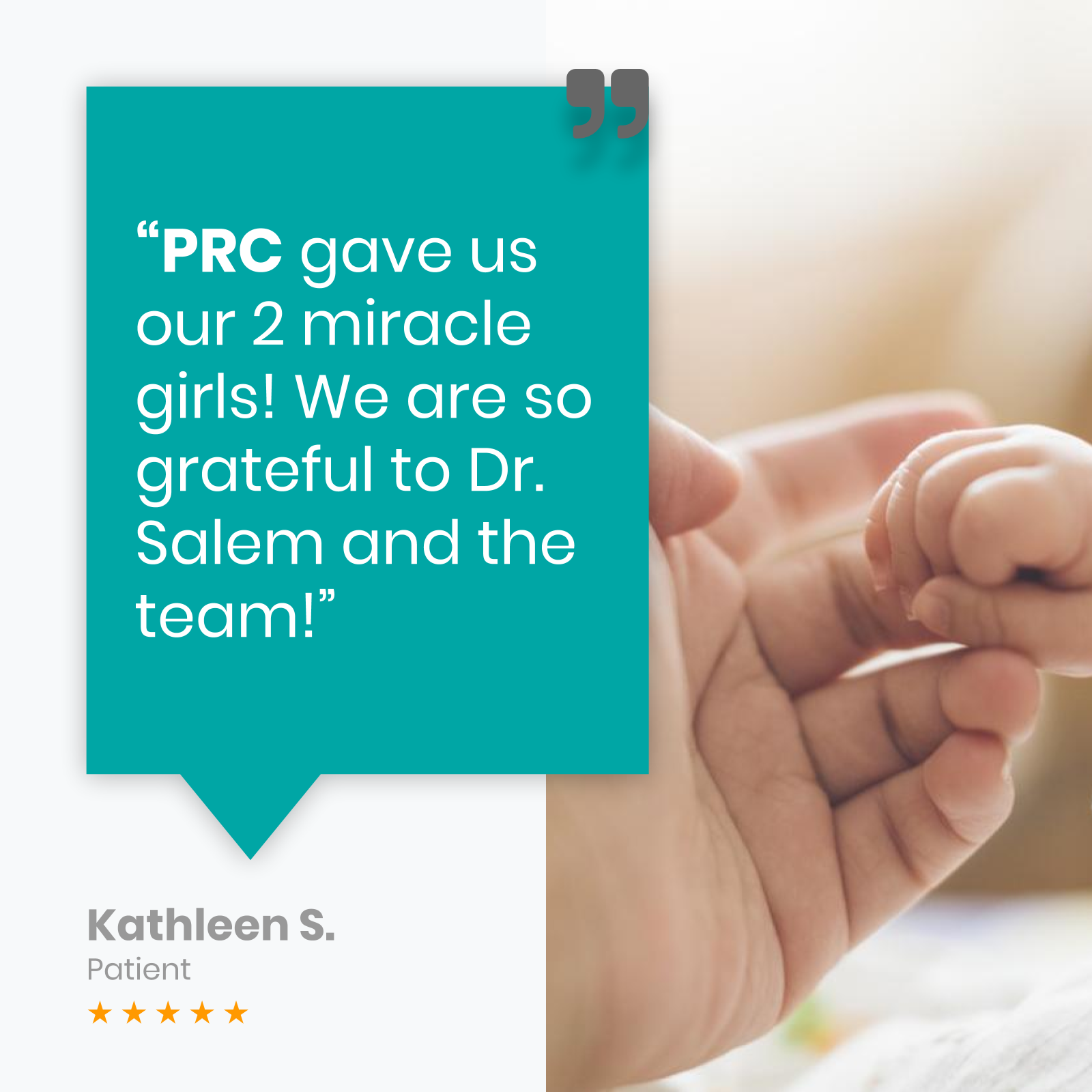Pacific Reproductive Center: IVF FAQs
Confidently determine if IVF is right for you.
In the United States, nearly 20% of people struggle with growing their families due to infertility, according to the CDC.
While infertility can take a mental, emotional, and physical toll on families of all sizes and backgrounds, it doesn’t have to be that way forever. IVF, or in vitro fertilization, is an optimal way to combat infertility and increase your odds of conceiving.
At PRC, we understand that IVF is a complex treatment option. If you or someone you love is considering IVF, it is always important to understand all that is involved, so we answer the most frequently asked and important questions on IVF.
Read on to learn more about IVF by exploring the most frequently asked questions and answers about IVF treatment in our IVF FAQs below.
Why is IVF performed?
IVF is performed to help a woman become pregnant. It is a form of fertility treatment that increases the odds of a viable pregnancy which may otherwise not be possible due to fertility problems such as advanced maternal age, blocked, damaged, or missing fallopian tubes, or male-led infertility.
How long is the IVF process from beginning to end?
A complete IVF treatment cycle typically takes about three weeks from beginning to end.
How common is IVF?
IVF is a very common fertility treatment option. According to the CDC, about 4 million births yearly are due to successful IVF treatment.
What is the difference between IVF and IUI (intrauterine insemination)?
The main difference between IVF and IUI is how the egg is retrieved and implanted.
IVF involves egg stimulation, retrieval, fertilization, and transfer. IUI is a more straightforward option that involves injecting sperm into a uterus to decrease the sperm’s travel time to the egg.
Before you decide on a fertility treatment option, it is best to get thoroughly evaluated by a fertility specialist who will outline the best treatment path for your unique needs.
What are the steps of IVF treatment?
IVF involves four main steps.
They include
- ovulation induction
- Intracytoplasmic sperm injection
- assisted hatching
- embryo transfer
Learn more about each step in the IVF treatment process.
What do you do to prepare for IVF treatment and increase your chances of pregnancy with IVF?
Because IVF can be mentally and emotionally taxing, it is important to properly prepare yourself for treatment by making important lifestyle changes before your procedure begins.
To increase your chances of pregnancy with IVF, It is best to:
- eat a well-balanced diet
- stop smoking
- nix alcohol consumption
- maintain a healthy weight
- start taking prenatal vitamins at least 30 days prior
- reduce or eliminate caffeine
- manage stress
What can you expect after IVF treatment?
For about two weeks following your IVF treatment, you may experience symptoms similar to that of early pregnancy, which can include any or all of the following:
- light spotting or bleeding
- cramping
- pelvic pain
- increased fatigue
- nausea
- tender or sore breasts
- an increased need to urinate
- changes in vaginal discharge
- a missed period
How do IVF injections work?
IVF injections are synthetic hormones that work by stimulating your ovaries to produce more than one egg at a time. This method is necessary because some eggs won’t fertilize or develop properly after fertilization.
What medications are used for IVF?
Various medications are used for IVF treatment. Discussing your exact medication lineup with your fertility specialist before beginning IVF is essential.
The most common IVF medications that help with:
- ovarian stimulation
- oocyte maturation
- preparing the uterine lining for implantation
- preventing premature ovulation
How effective is IVF in getting pregnant?
IVF is the most effective form of assisted reproductive technology treatment.
How long does it take to know you are pregnant after IVF?
Following embryo transfer, pregnancy confirmation is usually performed two weeks after with in-clinic pregnancy testing.
Although many women experience early pregnancy symptoms before the two-week mark, it is recommended that you wait at least two weeks before taking an at-home pregnancy test.
How soon after a failed IVF procedure can you try again?
We recommend waiting four to six weeks after a failed IVF procedure to try again.
Can you select the gender during IVF?
Yes, if you opt for genetic testing, you may select the gender during IVF treatment. However, if you do not undergo genetic testing, gender cannot be determined.
What is the success rate of IVF by age?
According to Penn Medicine, 21.3% of women younger than 35 will achieve a successful full-term singleton pregnancy.
Women 35 to 37 have about a 17% chance of viable pregnancy, while those older than 40 have about a 5.7% chance. The effectiveness of IVF decreases with a woman’s age.
Why do IVF treatments fail?
Several health and lifestyle factors may contribute to an IVF treatment failure.
The most common causes an IVF treatment failure include
- lifestyle factors, such as smoking, alcohol use, or obesity
- chromosomal abnormalities
- ovarian response
- implantation issues
- quality of the embryo
- woman’s age
It is important to remember that every patient’s IVF journey is unique to them. If you’ve experienced past IVF failures, you must speak with a fertility specialist to further evaluate your unique history.
How Much Does IVF Cost in California?
The cost of IVF in California depends on many factors. However, the average cost ranges from $15,000 to $20,000 for one cycle. For many, first cycles are successful, but some people might require more than a single round of IVF. To find out how much does IVF cost, you’ll also want to talk to your insurance company. Some insurances cover a portion of the cost, while some cover all.
What is the best age to get IVF?
There is no “right” age for IVF treatment, but considering how your age may play a role in IVF success is a good rule of thumb.
Generally speaking, women 35 and under have the highest IVF success rates, but women over 35 can still achieve a full-term pregnancy with IVF.
Innovative and Effective IVF Treatment in California
IVF is the most frequently recommended treatment option for parents struggling with infertility.
At PRC, we have helped hundreds of patients grow their families through successful IVF pregnancies and supplementary treatments yearly.
If you’re struggling with infertility, you’re not alone. IVF can help. Contact us today to get started on your fertility journey. We’re here for you.
Treatments
Pacific Reproductive Center has been successfully aiding conception for over two decades. We optimize the conditions of fertility treatment to give every potential parent the greatest chance of successful childbirth.
Resources
We ensure that every patient fully understands their medical condition and treatment options available to them. We understand each patient is unique so we help guide you through the best option to support your own fertility journey.
Looking for the Best Fertility Clinic in Southern California?
Pacific Reproductive Center has four convenient locations throughout Southern California, making it easy for patients to receive quality care close to home. Each IVF fertility center has an on-site lab, next-generation services, and state-of-the-art equipment.
Whether in Glendale, Torrance, Irvine, or Corona, our world-class fertility doctors can help you build the family you’ve always wanted.
3720 Lomita Blvd, Suite 200 Torrance, CA 90505
116 E. Broadway, Suite 300 Glendale, CA 91205
10 Post Irvine, CA 92618
381 Corporate Terrace Corona, CA 92879




